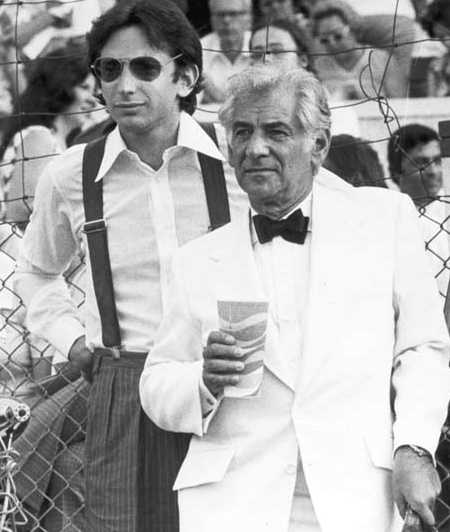The Finnish conductor Susanna Mälkki has been awarded the Nordic Council Music Prize 2017. It’s worth tremendous prestige and a decent amount of cash – DKK 350,000 ($55,000).

The Finnish conductor Susanna Mälkki has been awarded the Nordic Council Music Prize 2017. It’s worth tremendous prestige and a decent amount of cash – DKK 350,000 ($55,000).

We have been notified of the death of Mitchell Peters, principal timpanist of the Los Angeles Philharmonic from 1969 to 2006 and a prolific composer and teacher.
Here’s an appreciation from the Arizona Chapter of Percussive Arts Society:
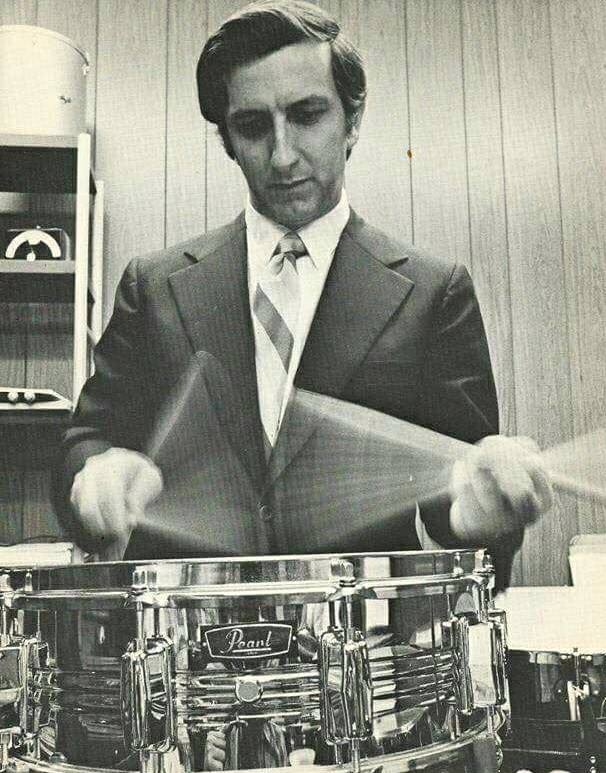
ENCINITAS (Oct. 28, 2017) – Mitchell Peters, a prodigious composer, recording artist, music professor, and former principal timpanist and percussionist with the Los Angeles Philharmonic Orchestra, died today in Encinitas at the age of 82.
Mr. Peters joined the Los Angeles Philharmonic as its co-principal percussionist in 1969 and retired as its principal timpanist in 2006. He performed under such conductors as Zubin Mehta, Carlo-Maria Giulini, André Previn, Esa-Pekka Salonen, Leonard Bernstein, Pierre Boulez, Sir Simon Rattle, John Williams, Michael Tilson Thomas and countless others.
Mr. Peters recorded extensively with both the Los Angeles Philharmonic and the Dallas Symphony in addition to various appearances on motion picture and television soundtracks.
You may have heard his timpani playing on ABC’s World News Tonight’s opening theme, in the movie 2010: The Year We Make Contact, and the original “Battlestar Galactica.”
In an effort to aid his students, Mr. Peters began writing his own material and eventually started a publishing company specializing in percussion works. As a widely published author and composer, Mr. Peters’ works and instructional materials remain highly regarded throughout the United States and abroad. His method books transcend generations and musical genres. In an interview, Pearl Jam drummer Matt Cameron stated that his teacher, “had me work with these books written by Mitchell Peters — and I’m still using those same snare drum books with my son and his friends.”
Mr. Peters published over three dozen compositions. Performances of some of his more popular pieces such as “Yellow After The Rain”, “Sea Refractions” and “Galactica” can be seen on Youtube. His final composition, “Firefly” was published in 2015 and dedicated to his three grandchildren.
Mr. Peters became the applied percussion teacher at California State University Los Angeles shortly after joining the LA Philharmonic and later accepted the position of Professor of Percussion at the University of California, Los Angeles. In addition, he was a faculty member at the Music Academy of the West in Santa Barbara. In May 2012, Mr. Peters retired from teaching.
More here.
We warned at the start of the year that the impresario Raymond Gubbay, disillusioned with the German company that bought his business, was emerging from retirement to start again.
Today we got notice of his first show, a two-week run next summer of a Barry Humphries evening of Weimar cabaret, with live orchestra, of course.
Details here.
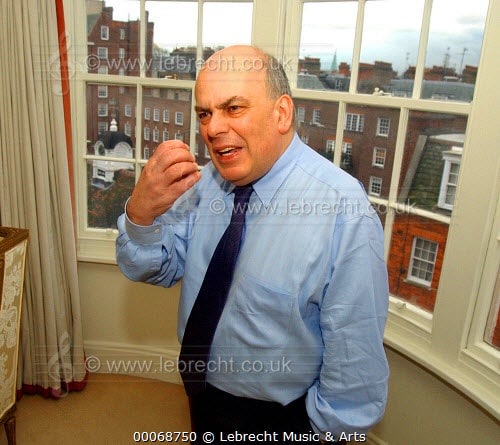
The Chinese pianist has told German media that he ‘hopes to play’ during the summer of 2018, and that his comeback piece will be Bach’s Goldberg Variations.
Lang Lang, 35, has been out since April this year with left-arm tendonitis. Speculation has begun to surface in Chinese media that he may not fully recover.
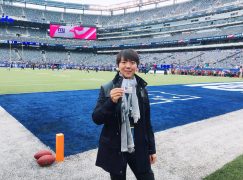
An exclusive insider’s report from Zsolt Bognár:
The arrival of Martha Argerich in any musical community is greeted with a sense of disbelief often dispelled only the moment she walks onto stage—“yes, it is happening”—only to be replaced by another form of disbelief and incredulity when witnessing her musical powers. Joining her for this occasion is a pianist of equally staggering prowess, long known to Cleveland audiences, and with quickly-growing fame throughout the world: Sergei Babayan.
Having witnessed, for several years in Europe and here in America backstage in halls, onstage as page-turner, in the practice room, and in close quarters with them away from musical pursuits, I can report that these artists are two of the most dedicated and hard-working human beings. Their personal friendship is as natural and meaningful as their musical partnership, and I have the impression that their sense of duty is foremost in the intense shaping of music in an atmosphere of sequestered privacy and mutual learning, usually during the wee hours of the night—almost without break until the sun rises the next morning.
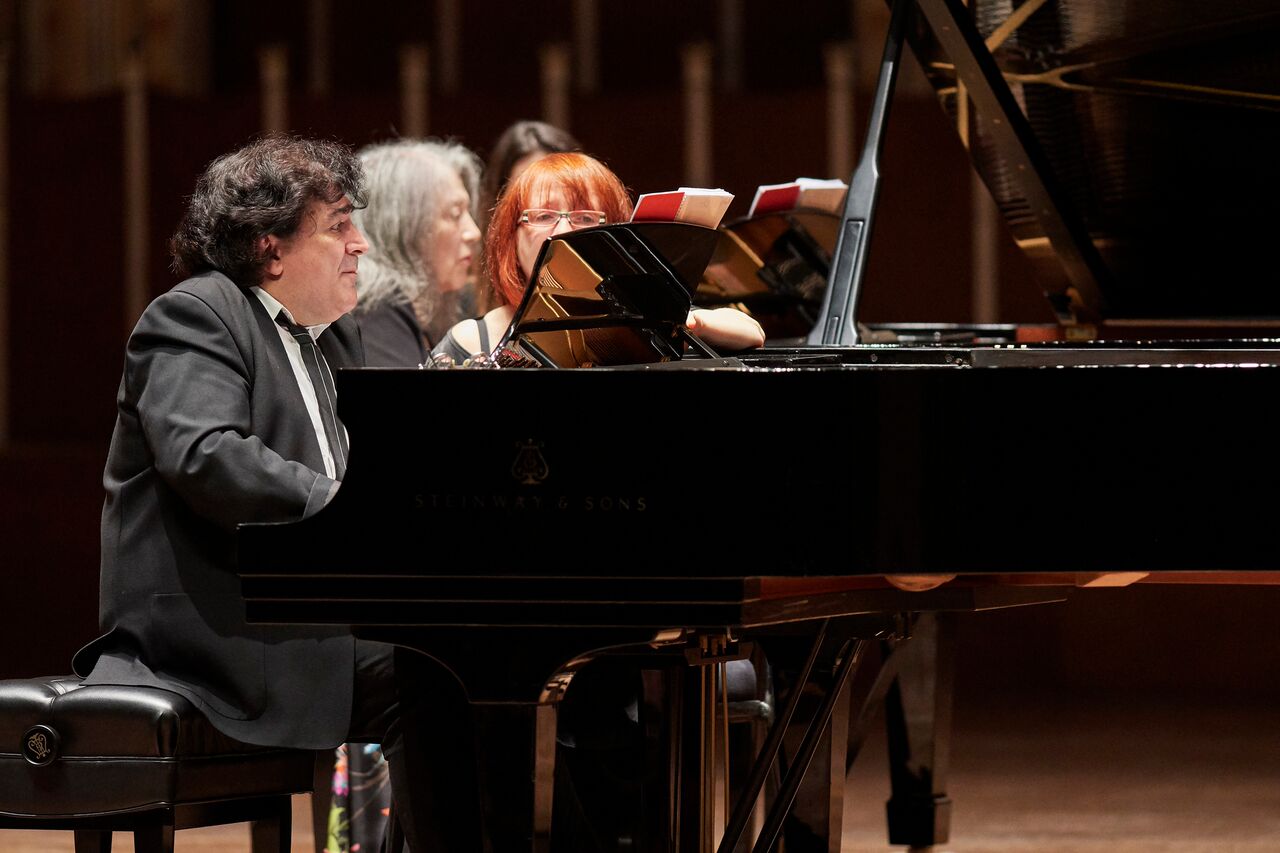
Musicians of such global presence are drawn to projects dictated in content and location by musical friendships. Cleveland owes thanks to CIPC President Pierre Van Der Westhuizen as the sole reason for Ms. Argerich’s first appearance in the city —some thirty-plus years after her only other would-be appearance here was thwarted by a car accident en-route from Montreal.
Some five years ago, Sergei Babayan undertook a massive project to make arrangements of Prokofiev scores for two-piano collaborations with Martha Argerich, several of which saw premieres at the Lugano Festival. When Babayan and Martha Argerich strolled onto the stage at Severance Hall— Cleveland’s crown jewel of Georgian and Art Deco elegance— the audience projected prolonged ovations. The opening hammer blows of the Prokofiev Prologue signalled with frightening and ominous intensity the magnitude of the evening, with duelling pianos capable of apocalyptic and orchestral intensity, hypnotic trances, poetic grace, and celestial evocations of light and colour. These were delivered with electrifying rhythmic vitality, rapidly interjecting and interweaving piano parts, as well as moments of whimsical wit and grace. The classical elegance and lightness with which the performers deployed the Gavotte left audience members giggling with delight. The Young Juliet was an incredible showcase for both performers. The deliberate manner in which the Dance of the Mandolins unfolded was fantastically inevitable in its chromatic traversal of devilishly witty harmonies. For many of my musical colleagues, especially those who ponder how time changes pianistic facility, Martha Argerich fittingly represents eternal youth and Juliet’s fresh and impassioned idealism, and love for life.
The truest miracles of the evening were revealed in the Mozart Sonata for Two Pianos in D Major, K. 488. This piece was shared with a range of the human experience unheard of in most performances, and the interplay of the parts was delivered with seamless transparency, and unfolded with improvised joy. Within the course of specific turns of phrase—ordinary and derivative in lesser hands—the rhetoric was confiding, as though to impart the joys and sorrows of a lifetime. The tempi in the outer movements were breathtaking. The performers were on a matched wavelength to an extent that left one to consider whether musical soulmates are determined by larger forces in the universe.
A delightful aspect of witnessing Sergei and Martha’s friendship is how they make seemingly bemused remarks to each other during the applause as they walk on and off stage, noticing the hall and people. I stood to applaud after the Mozart and shouted my bravi. In a fleeting moment I cannot forget, Sergei pointed me out by name to Martha, who stopped in her tracks to smile.
Concluding the evening was the U.S. Premiere of the Seven Piano Pieces transcribed by Babayan, selected from operatic, incidental and film music by Prokofiev. This cycle was a tour de force that outdid even the dynamic impact of the Romeo and Juliet cycle. “The Ghost of Hamlet’s Father” was overwhelmingly and metaphysically terrifying. The incidental music to Eugene Onegin was intoxicating in its rhetoric, and the concluding “Idée fixe” is the most obsessively ominous music that Prokofiev ever composed—and the finale was completed with an effective ending that was Sergei Babayan’s own creation. The audience reaction was near pandemonium.
Trembling with excitement, I found myself hoping for the solidarity of gratitude rendered from rhythmic unison clapping that is typical of Europe and Russia, but not in America. I invited my friends sitting next to me to attempt it, and it spread to the entire hall. We had heard both Sergei and Martha at their most reactive, virtuosic, and inventive best. I brought bouquets for both performers, and kissed each on the hand. The audience was rewarded with two significant encores from the Rachmaninoff First and Second Suites. For Cleveland, this was the coup of a lifetime.
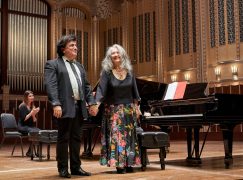
photos (c) Roger Mastroianni
A volume of protest from music lovers has persuaded the town of Klin not to remove its Tchaikovsky statue to an outer circle of suburbs. It will remain where it belongs, in the centre, in Sovietskaya Square.
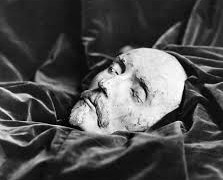
We hear that the Los Angeles Philharmonic has offered its principal oboe position to Ramon Ortega, principal of Bayerischer Rundfunk in Munich for the past nine years.
If he accepts, he will be the first player from a European orchestra to take a principal oboe seat in a major US orch.
Ramon, 29, originally from Granada, has asked for time to decide.
His dilemmas:
Jansons or Dudamel?
Skiing or surfing?
Sauerkraut or sushi?
No habla espanol or habla plenty?
Hochschule teaching or Hollywood?
Tough call.
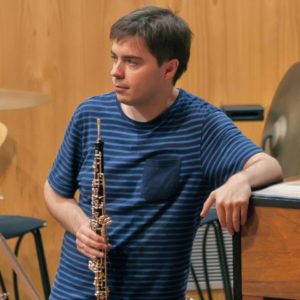
The French president was in Strasbourg on Monday on government business.
What to do in the evening? He drops in unannounced to the Opéra National du Rhin to see a performance of Carmen involving young people of diverse backgrounds from the region.
Visite surprise à l’Opéra @strasbourg d’@EmmanuelMacron : répétition #Carmen participatif @AlainFontanel #lucianobibiloni #CulturePourTous pic.twitter.com/ig1ziRWNN9
— Opéra du Rhin (@Operadurhin) October 31, 2017
Report here.
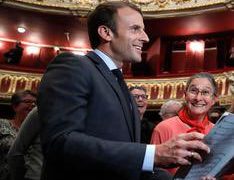
Radio Prague has reported the death of Ladislav Kubik, a Czech composer who left the country for the US after the fall of Communism.
In 1990 he was appointed Professor of Composition at Florida State University in Tallahassee.
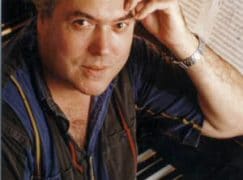
Michael Tilson Thomas, who announced his retirement from the San Francisco Symphony last night, has his champions and detractors like every other conductor of his generation.
But looking over the half-century span of his career one has to be struck by the old-fashioned virtues that inform it.
1 MTT has only ever been music director of three orchestras: Buffalo (1971-1979), London Symphony Orchestra (1988-1995 and San Francisco (1995-2020).
2 He never flitted between two jobs, never squeezed other dates into long tours. He committed to the job.
3 Aside from his three successive posts, he founded and continues to lead the New World Symphony, probably America’s most important training orchestra.
4 He never bothered with opera.
5 While he made plenty of recordings, these were not a career motivation. He loves giving concerts.
Some of these old-fashioned virtues may have been imbued from his mentor (below), but it has been a while since a leading conductor had so well defined a career.
